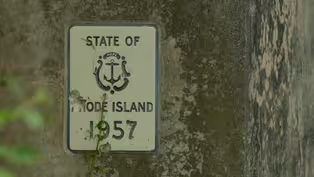
Weekly Insight
Clip: Season 6 Episode 25 | 4m 5sVideo has Closed Captions
Spending is outpacing taxes in RI. And there’s news on the bottle bill.
Spending from the Rhode Island State General fund is estimated to grow by almost 4% in financial year 2026. Anaridis Rodriguez and WPRI 12’s Politics Editor contributor Ted Nesi discuss how the spending is outpacing tax receipts. Also, new developments in the long-discussed “bottle bill” send the proposal back to the drawing board.
Problems playing video? | Closed Captioning Feedback
Problems playing video? | Closed Captioning Feedback
Rhode Island PBS Weekly is a local public television program presented by Ocean State Media

Weekly Insight
Clip: Season 6 Episode 25 | 4m 5sVideo has Closed Captions
Spending from the Rhode Island State General fund is estimated to grow by almost 4% in financial year 2026. Anaridis Rodriguez and WPRI 12’s Politics Editor contributor Ted Nesi discuss how the spending is outpacing tax receipts. Also, new developments in the long-discussed “bottle bill” send the proposal back to the drawing board.
Problems playing video? | Closed Captioning Feedback
How to Watch Rhode Island PBS Weekly
Rhode Island PBS Weekly is available to stream on pbs.org and the free PBS App, available on iPhone, Apple TV, Android TV, Android smartphones, Amazon Fire TV, Amazon Fire Tablet, Roku, Samsung Smart TV, and Vizio.
Providing Support for PBS.org
Learn Moreabout PBS online sponsorship- Ted, welcome back.
Since we last spoke, we've had a little bit more time to digest the $14 billion state budget plan that Rhode Island lawmakers unveiled on June 10th.
We talked about some of the taxes and fees that will be going up in this plan, but you've also been crunching the numbers and finding a trend when it comes to spending.
- Well, it's really striking Anaridis, because if you go back to right before the pandemic and the eve of COVID, the state budget was a little under $10 billion in Rhode Island.
People already said, oh, that's a lot of money.
And then it went up really fast during the pandemic.
Billions of dollars added to the budget.
But what we were often told, when reporters say, wow, these numbers have gotten really high, people would say, well, there's a lot of federal money flowing in to help with COVID, relief money after COVID, that'll get spent, the budget will get bigger, and then it's like an accordion.
It's gonna get smaller again once that money weans out.
Well, that money's fading out now, and the budget is not getting smaller.
And part of the reason for that is that state lawmakers are adding more state-level revenue that's replacing a lot of that federal revenue that had come in for temporarily in the last few years.
And I think that's a big reason you're seeing all these tax and fee increases in this budget.
The Taylor Swift tax on houses, the gas tax going up, the health insurance assessment fee, all the different fees and revenue things are doing in this budget.
- Estimates are finding that spending from the State General Fund will go up by almost 4% during this new fiscal year which starts July 1st.
And you're finding that that's slower than the pace of spending during the pandemic, but higher, a lot higher than the rate at which the tax receipts are coming in.
- Yeah, and that's the eternal question, right?
And the effect that tax revenue goes up like this every year and spending goes up like this.
Well, you don't have to be Albert Einstein to see the math gap there.
And there's a reason for it.
Every year there's demand for more spending on things like healthcare, on education, on transportation.
And the legislature is nearly all democratic.
The Democrats generally have sympathy for those goals, so they wanna do as much of it as they can, which means they have to go look for new revenue sources 'cause the money is just not keeping up with the demand there.
And bigger picture, I just don't know of anybody with a theory, Anaridis, on how you get out of that dynamic.
How you stop, how you get to a point where the budget is roughly in balance, so every year your tax receipts go up this much, and then what you wanna spend on goes up this much, which is why this dynamic continues.
- And analysts are already predicting that we are gonna see deficits in the years to come.
Let's turn to another topic long discussed on Smith Hill, and that is the Bottle Bill, which is a proposal that would make consumers pay a 10-cent redeemable deposit on cans and bottles.
A study looked at this for 18 months, but this week, the House Speaker and the Senate President came out and said we're not moving this bill forward.
Instead, we need another needs assessment.
And here's what the Speaker had to say about this decision.
- This is a professional needs assessment, looking at what other states have done, the best way to implement it, the cost of it.
Do we need a Bottle Bill at all?
Do we need EPR?
Do we need a combination thereof?
There's a lot of conflicting data that came out of the study commission, so this is a way to sift through all that data and look at the best practices.
- Ted, we should say that EPR refers to Extended Producer Responsibility, which requires manufacturers to deal with the entire life cycle of their products, including the recycling.
This latest development, Ted, certainly a big disappointment for advocates.
- Yeah, many of them, Anaridis, as thought this was their year to get a Bottle Bill.
I mean, as you said, this has been discussed for so long, back to the 1980s, I think, was when this was first brought up.
But there was major, major pushback from industry up on Smith Hill.
A lot of companies were calling this a beverage tax, not a Bottle Bill, saying this is a tax on consumers when they buy a bottle or a can, even if you say it's gonna get redeemed at the other end.
I think Speaker Shekarchi was hoping that with some time there'd be some consensus development.
Not everyone's happy, but everyone could live with it.
He never really saw that.
And so that's why I think he's kicking it along with the Senate President to this new needs assessment, which is gonna take another 18 months, won't report until the end of 2026, which means it'll be after the next election in 2027 is the first we'll see them take it up again.
- Certainly not the last time we'll hear about this.
- I don't think so.
- Ted, thank you for being here.
- Good to be here.
Video has Closed Captions
Clip: S6 Ep25 | 7m 29s | Providence’s first distillery since Prohibition makes waves with unique flavors. (7m 29s)
Video has Closed Captions
Clip: S6 Ep25 | 7m 43s | Despite repairing some 290 bridges, RIDOT still has a backlog of “Poor” bridges. (7m 43s)
Video has Closed Captions
Clip: S6 Ep25 | 5m 13s | Perseverance advice from a man who biked across America and ran 50 marathons. (5m 13s)
Providing Support for PBS.org
Learn Moreabout PBS online sponsorship
- News and Public Affairs

Top journalists deliver compelling original analysis of the hour's headlines.

- News and Public Affairs

FRONTLINE is investigative journalism that questions, explains and changes our world.












Support for PBS provided by:
Rhode Island PBS Weekly is a local public television program presented by Ocean State Media


